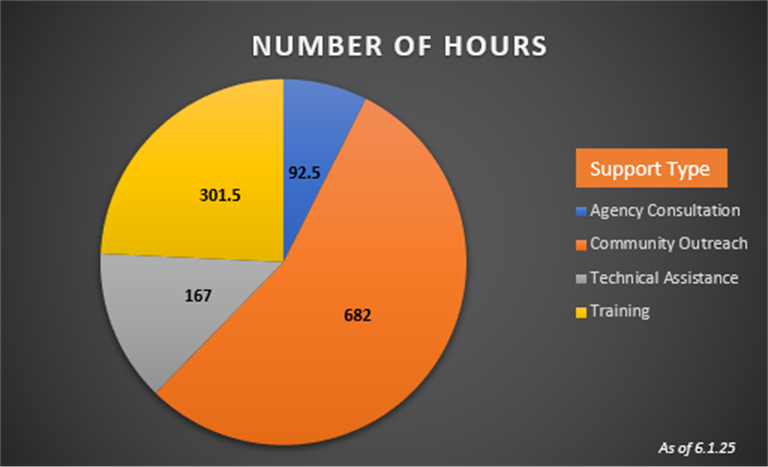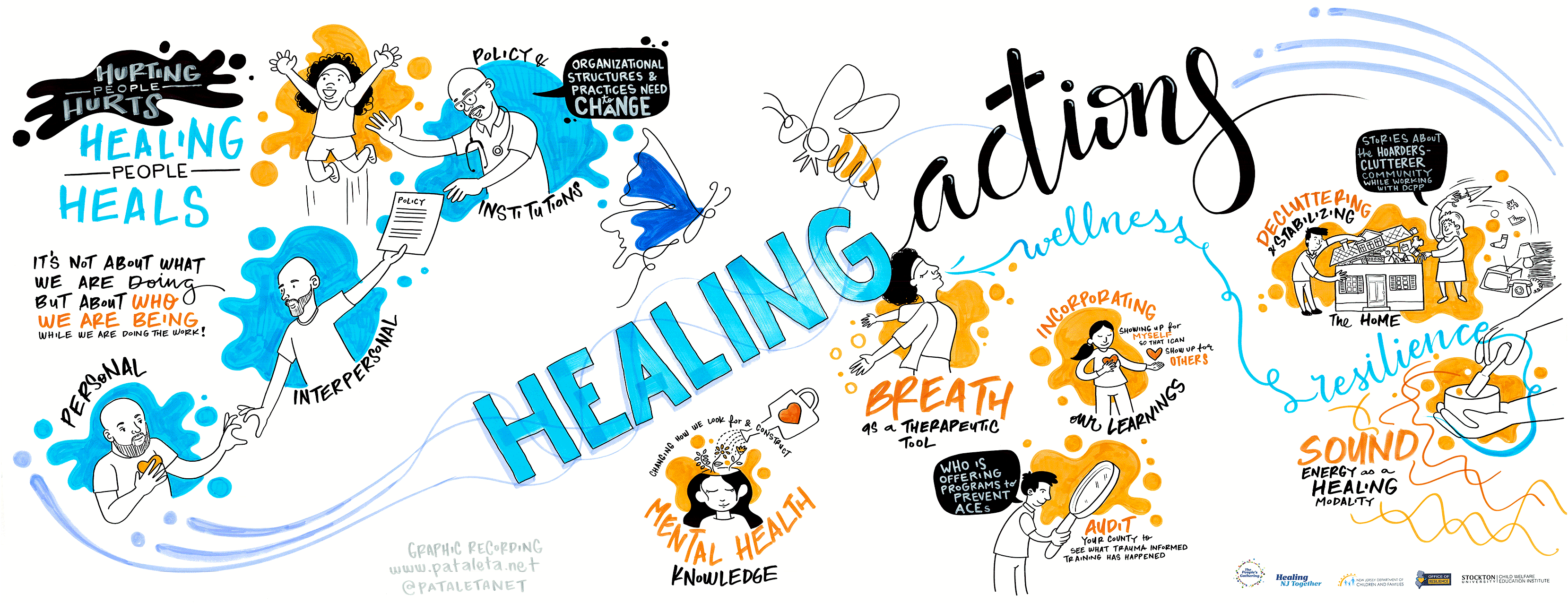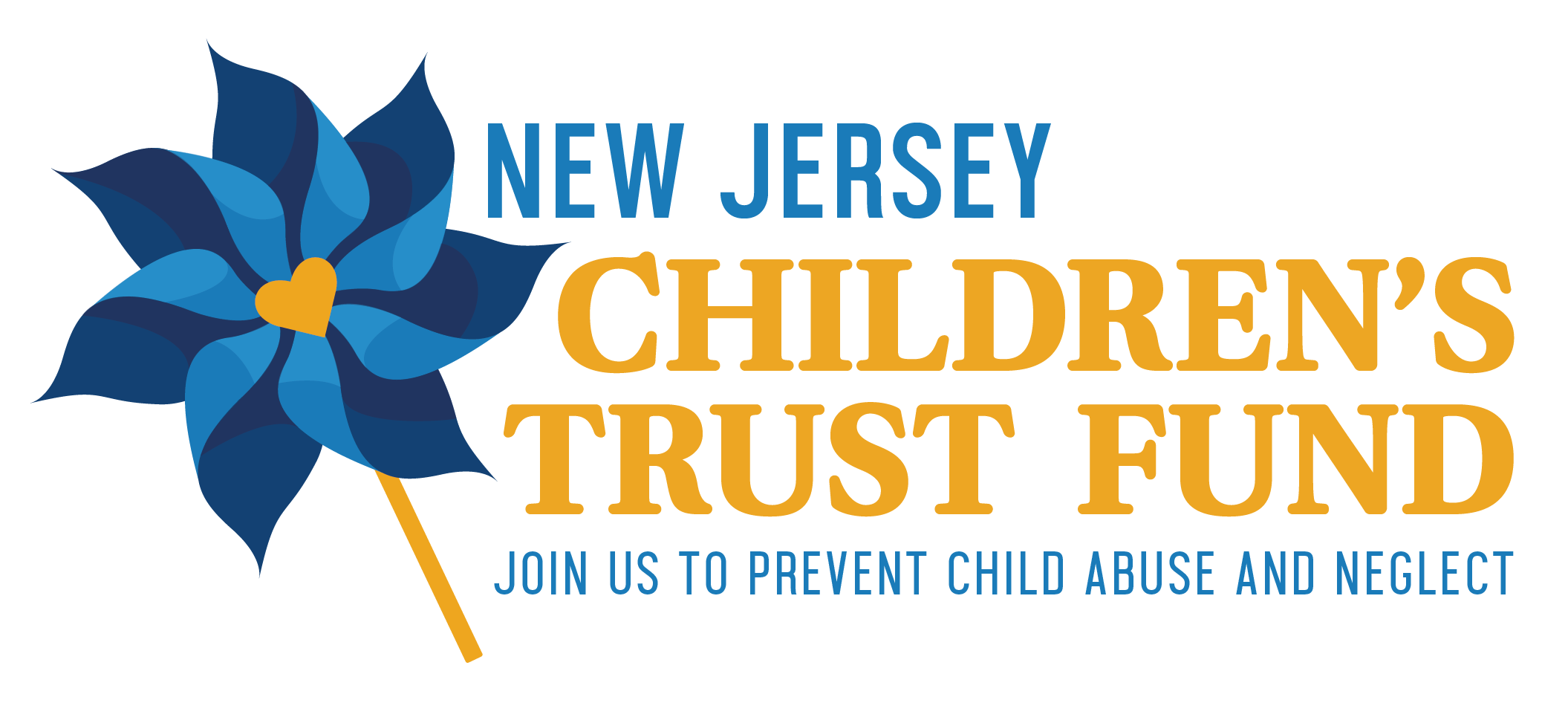


New Jersey is a trauma-informed and healing-centered state, creating opportunities to prevent and empower healing from individual transgenerational, and community trauma.
The mission of The Office of Resilience is to be an incubator and advocate for community-developed solutions, grounded in positive and adverse childhood experiences science, that help to create a healing-centered ecosystem where all NJ residents thrive. Created in June 2020, this Office is located within the NJ Department of Children and Families while being a resource across State agencies.
Foundations Course (Training the Trainer Introduction)
TRUST Assessment Tool
Consultation and Coaching
Resilient NJ Collaborative
The Challenge of Technoference
Contact Us
The New Jersey Office of Resilience’s Trauma Informed Approach Continuum describes the knowledge, skills, and behaviors that are associated with the process of understanding and integration of trauma
informed principles and practices within an organization. This continuum is a modified version of the Missouri Model (2019), combined with the Healing Centered Engagement Model (Ginwright, S., 2018). It moves from trauma awareness to healing-centered, articulating a profound shift in which policies, environments, and interactions consistently prioritize trauma-informed principles to prevent retraumatization and foster healing. The stages move progressively from foundational behaviors and skills to more complex ones. The behaviors and skills are not mutually exclusive, and organizations may attain competencies across the continuum. As new knowledge becomes available, the stages in the continuum may be repeated.
Trauma Aware
- Organizations have become aware of how prevalent trauma is and have begun to consider that it might impact their clientele and their staff.
- Staff are introduced to the paradigm shift from, “What’s wrong with you?” to “What happened to you?” when considering the root causes of behavior.
- Staff at all levels understand the word trauma and how it can change the way they view and interact with others.
- Workplace safety is prioritized and considers physical, psychological, and moral factors
Trauma Sensitive
- Organizations promote and value a trauma-informed lens, through exploring the principles of
trauma-informed care within their environment and daily work. - Organizations are building consensus around trauma-informed principles.
- Organizations consider the implications of embedding trauma-informed principles across
policies and practices. Avenues for change are considered and explored. - Trauma training is facilitated for all staff, including when onboarding new employees.
- Staff feel supported and have space/s for their voices to be heard.
Trauma Responsive
- Organizations have begun to change their organizational practices to highlight the role of trauma. At all levels of the organization, staff begin rethinking the routines and infrastructure of the organization.
- Staff utilizes language that supports safety, trust and transparency, voice and choice, collaboration, and empowerment. Staff applies knowledge of trauma and resilience internally and externally.
- Organizations have policies that support addressing staff’s personal, secondary and vicarious trauma.
- A “universal precautions” approach is used, presuming that any/all clientele and staff may be trauma impacted.
- People with lived experience, including staff, are engaged in meaningful roles throughout the agency.
Individuals outside the organization understand that trauma-informed approaches are at the center of
the mission.
Healing Centered
- Organizations shift from an individual’s “identity focused on trauma” to “identity focused on possibility”; paradigm shift moves from “What happened to you?” to “What’s right with you?” to counteract the tendency of traumatic experience being seen as, ‘less than’.
- Behavior is understood as an indicator of stressors, rather than “misbehavior” or as a symptom of individual trauma; organization works to address factors that cause trauma, mitigate its effects and prevent trauma from re/occurring,
- Trauma interventions shift from individual-focused to community-focused as healing centered: policies and practices that are impartial are integrated into the fabric of the work.
- Aim is for restoration and healing that is rooted in identity, versus coping with symptoms, utilizing authentic human connection to heal.
- Healing-centered engagement focuses on the well-being we want.
- Approaches to providing services are trauma shielding or trauma reducing. Practices are reflective and collaborative, promoting learning, growth and prevention. Past experiences are utilized for making meaning and relational leadership is thriving.
References:
Delaware Developmental Framework for Trauma-Informed Care (2019).
https://governor.delaware.gov/wp-content/uploads/sites/24/2019/02/Delaware-Developmental-Framework-FSCC.pdf
Ginwright, S. (2018, May 31). The future of healing: Shifting from trauma informed care to healing
centered engagement. Medium, retrieved from https://ginwright.medium.com/the-future-of-healing-shifting-from-trauma-informed-care-to-healing-centered-engagement-634f557ce69c
Missouri Model (2019). https://dmh.mo.gov/media/pdf/missouri-model-developmental-framework-trauma-informed-approaches
https://www.samhsa.gov/mental-health/trauma-violence/trauma-informed-approaches-program
Organizations interesting in hosting this free 2-day opportunity, contact us via email at DCF.OfficeofResilience@dcf.nj.gov
Top ^
Developed by the New Jersey Department of Children and Families’ (DCF) Office of Resilience, this 8-hour training covers trauma-informed principles, concepts of resilience, trauma-informed approaches and healing-centered cultures. The prevalence and effects of trauma on children and adults will be explored.
The training will discuss the impact of Positive and Adverse Childhood Experiences (PACEs) and how Positive Childhood Experiences (PCEs) can help to mitigate the impact and promote healthier outcomes for families. Participants will be introduced to trauma-informed approach principles and implementation domains, a model for creating healing centered cultures as presented by the Substance Abuse Mental Health Services Administration (SAMHSA) and
The objectives of the training are to:
- Define types of trauma
- Explain neurobiology of trauma and the impact on development and functioning
- Describe toxic stress and the disparities on various populations
- Discuss Positive and Adverse Childhood Experiences (PACEs) and outcomes
- Define resilience and review resilience factors
- Explore the intersection of culture on trauma and resilience
- Illustrate trauma-informed and healing-centered principles and applications
The training is designed to be facilitated in two 4-hour modules. It is recommended to be held over a minimum of two sessions to allow participants time to process the content and explore practical applications of the materials presented. The agenda topics for the modules are as follows:
|
Day 1
|
Day 2
|
Please contact dcf.officeofresilience@dcf.nj.gov for more information on how to receive the training or to become a certified trainer of this foundational course.
Top ^
How Trauma Informed is your organization?
Click here to learn more on Trauma Informed Practices.
Top ^
"We have our TRUST results - now what?"
Click here to learn more on our consultation and coaching model and contact us via email at DCF.OfficeofResilience@dcf.nj.gov to schedule.
Click here to join our virtual statewide quarterly meetings to hear of TI initiatives and to network with likeminded people.
Top ^When technology disrupts quality time and interactions with loved ones.
Want to learn more? Click here.
Top ^
Click here to contact us at dcf.OfficeofResilience@dcf.nj.gov to express interest in receiving invites to join our virtual statewide quarterly meetings to hear of TI initiatives and to network with likeminded people.
Top ^





